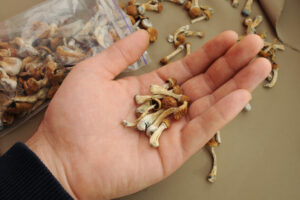Unlocking Brain Potential: How Magic Mushrooms Enhance Cognitive Abilities
- December 20, 2023
- 3:04 am

Notable Elements
Psilocybin’s Role in Cognitive Enhancement: Magic mushrooms, containing psilocybin, are being studied for their potential to enhance cognitive abilities, including creativity, problem-solving, and mental flexibility.
Neuroplasticity and Creativity: Psilocybin promotes neuroplasticity, enabling the formation of new neural connections, and is linked to increased creativity and innovative problem-solving skills.
Ego Dissolution and Mental Flexibility: Experiences of ego dissolution under the influence of psilocybin can lead to greater open-mindedness and mental agility.
Microdosing for Mindfulness and Focus: Anecdotal evidence suggests that microdosing psilocybin can improve mindfulness and concentration, enhancing cognitive function and emotional balance.
Revival in Psilocybin Research: Institutions like Johns Hopkins University and Imperial College London are leading the way in researching psilocybin’s effects on brain function and its potential cognitive benefits.
Therapeutic Applications: Beyond cognitive enhancement, psilocybin shows promise in treating depression, anxiety, and addiction by altering entrenched behavioral patterns and brain connections.
Safety and Legal Landscape: Psilocybin is generally safe under medical supervision, but its intense psychological effects and legal status as a Schedule I substance pose challenges to accessibility.
Cultural Shift in Perception: The growing body of research is shifting the perception of psilocybin from a recreational drug to a potential tool for addressing complex mental health challenges and enhancing cognitive abilities.
Personal Development and Well-being: Psilocybin experiences often lead to profound personal insights, improved life satisfaction, and a heightened sense of empathy and connection.
Importance of Set and Setting: The outcome of a psilocybin experience is significantly influenced by the individual’s mindset and the environment in which it is consumed.
Future Research Directions: Ongoing studies aim to explore the broader implications of psilocybin for creativity, emotional well-being, and spiritual understanding, with the goal of integrating it into mainstream medicine.
A Psychedelic Renaissance: Psilocybin is at the forefront of a new era in cognitive science and mental health treatment, with the potential to unlock previously unexplored facets of the human mind.
Introduction
Unlocking Brain Potential: How Magic Mushrooms Enhance Cognitive Abilities
In the realm of cognitive enhancement, a rather unorthodox candidate has been making waves: magic mushrooms. Known scientifically as Psilocybe species, these mushrooms contain the psychedelic compound psilocybin, which recent studies suggest may have significant potential in enhancing cognitive abilities. This article delves into how magic mushrooms are being re-evaluated in the context of cognitive enhancement and mental health treatment.
Understanding Psilocybin
Psilocybin, the active compound in magic mushrooms, is a naturally occurring psychedelic. When ingested, it’s converted to psilocin, which is responsible for the mushrooms’ psychedelic effects. Psilocin’s mechanism of action involves the stimulation of serotonin receptors in the brain, particularly the 5-HT2A receptor, which plays a critical role in regulating mood, cognition, and perception.

The History of Magic Mushrooms
The use of magic mushrooms dates back thousands of years, with numerous indigenous cultures using them for religious and spiritual purposes. In modern times, they gained popularity in the 1960s as a symbol of counterculture. However, their legal status became highly restricted under the Controlled Substances Act of 1970, which severely limited research into their potential benefits.
Cognitive Enhancement and Psilocybin
Recent studies have reignited interest in psilocybin, especially concerning its potential to enhance cognitive abilities. This interest is grounded in several areas:
Neuroplasticity
One of the most groundbreaking aspects of psilocybin research is its potential to promote neuroplasticity – the brain’s ability to form new neural connections. Enhanced neuroplasticity can lead to improved learning, memory, and problem-solving skills.
Creativity and Problem-Solving
Users of psilocybin often report increased levels of creativity. This is thought to result from the breaking down of usual thought patterns and the formation of new neural pathways, allowing individuals to approach problems from unique perspectives.
Ego Dissolution and Mental Flexibility
Psilocybin has been noted to induce a state of “ego dissolution,” where users report a sense of oneness with the universe and a breakdown of personal identity barriers. This can lead to increased open-mindedness and mental flexibility, valuable traits for cognitive enhancement.
Mindfulness and Focus
There is anecdotal evidence suggesting that low doses of psilocybin can improve mindfulness and focus. This phenomenon, often referred to as “microdosing,” involves taking sub-hallucinogenic doses of psychedelics to enhance cognitive function and emotional balance.
The Research Landscape
The revival of psilocybin research has led to several studies exploring its cognitive benefits:
Johns Hopkins University
Researchers at Johns Hopkins University have been at the forefront of psilocybin research. Their studies have shown that psilocybin can lead to significant improvements in various mental health conditions, potentially enhancing cognitive abilities as a secondary effect.
Imperial College London
The Psychedelic Research Group at Imperial College London has conducted extensive research on psilocybin, demonstrating its potential to alter consciousness and promote a state conducive to enhanced creativity and problem-solving.
Other Studies
Numerous other studies have explored the effects of psilocybin on brain function, consistently finding that it can alter the way different regions of the brain communicate, potentially enhancing cognitive abilities.
Potential Therapeutic Applications
Aside from its cognitive enhancement potential, psilocybin shows promise in therapeutic settings:
Treatment of Depression
Psilocybin has been effective in treating depression, especially in cases where patients are resistant to traditional antidepressants. By rewiring brain connections, psilocybin can provide a new therapeutic pathway.
Anxiety Reduction
Studies have shown that psilocybin can significantly reduce anxiety, particularly in patients with life-threatening diseases. This anxiolytic effect can contribute to overall cognitive well-being.

Addiction Treatment
Emerging research indicates that psilocybin may be helpful in treating various forms of addiction, including nicotine and alcohol dependence, by disrupting entrenched behavior patterns.
Safety and Legal Considerations
While the potential of psilocybin is immense, it is important to consider safety and legal issues:
Safety Profile
Psilocybin is generally considered safe when used under medical supervision, with few physical side effects. However, psychological effects can be intense, and it’s not recommended for individuals with a history of psychosis.
Legal Status
Psilocybin remains a Schedule I controlled substance in many countries, including the United States. However, there is a growing movement toward decriminalization and legal medical use.
Also Read : Navigating the Legal Landscape: Magic Mushrooms and the Law
Expanding the Understanding of Magic Mushrooms
As we delve deeper into the cognitive potential of magic mushrooms, it’s essential to understand the broader implications of this research. The resurgence in psilocybin research is not just a scientific endeavor but also part of a larger movement to reassess the role of psychedelic substances in society and medicine.
Cultural Shift in Psychedelic Perception
For decades, the perception of psychedelics has been marred by their association with recreational abuse and countercultural movements of the 1960s. However, the current wave of research is shifting this perception. Psilocybin, once known primarily for its role in recreational drug use, is now being recognized for its potential to address some of the most challenging mental health issues of our times, while also enhancing cognitive abilities.
Personal Development and Enhanced Well-being
Beyond its therapeutic applications, psilocybin presents opportunities for personal development. Individuals who have experienced psilocybin often report profound personal insights and life-altering experiences. These experiences can lead to improved life satisfaction, greater empathy, and a renewed sense of connection with others and the world. This aspect of cognitive enhancement – the ability to broaden one’s perspective and enhance emotional intelligence – is as crucial as the more direct cognitive benefits.
The Role of Set and Setting
A critical factor in the psilocybin experience, whether for therapeutic purposes or cognitive enhancement, is the concept of “set and setting.” This term refers to the mental state of the individual (set) and the physical and social environment (setting) in which psilocybin is consumed. Positive outcomes are often associated with a supportive, comfortable, and safe setting, along with a positive mindset going into the experience. This highlights the importance of context in determining the outcome of a psilocybin experience.
Future Research and Potential
The future of research into magic mushrooms and psilocybin is promising. With increasing interest from the scientific community and more liberal legal frameworks, we are likely to see a deeper understanding of how these substances can be used safely and effectively. Ongoing and future studies are expected to not only delve deeper into the cognitive enhancement potential of psilocybin but also explore its broader implications for improving creativity, emotional well-being, and even philosophical and spiritual understanding.
Integrating Psilocybin into Mainstream Medicine
The ultimate goal of current psilocybin research is to integrate it into mainstream medicine. This involves not only proving its efficacy and safety but also overcoming legal, cultural, and educational barriers. As we progress, it’s conceivable that psilocybin could become a standard tool in psychology and psychiatry for both therapeutic applications and cognitive enhancement.
Conclusion
The exploration of magic mushrooms in the context of cognitive enhancement is a testament to the ever-evolving understanding of the human mind and the substances that can alter its functioning. From a taboo to a tool for mental health and cognitive improvement, psilocybin is at the forefront of a psychedelic renaissance, promising new avenues for treatment and personal growth. As research continues to unfold, the potential of magic mushrooms to unlock aspects of the human mind we’ve yet to understand fully remains one of the most exciting prospects in the field of cognitive science.

Hi! I’m Jacob Hawthorne, a passionate medical student dedicated to exploring the fascinating world of psychedelics, particularly magic mushrooms (commonly known as shrooms). With a deep interest in their therapeutic potential and profound effects on the human mind, I aim to provide accurate and evidence-based information about shrooms in the Canadian context.
